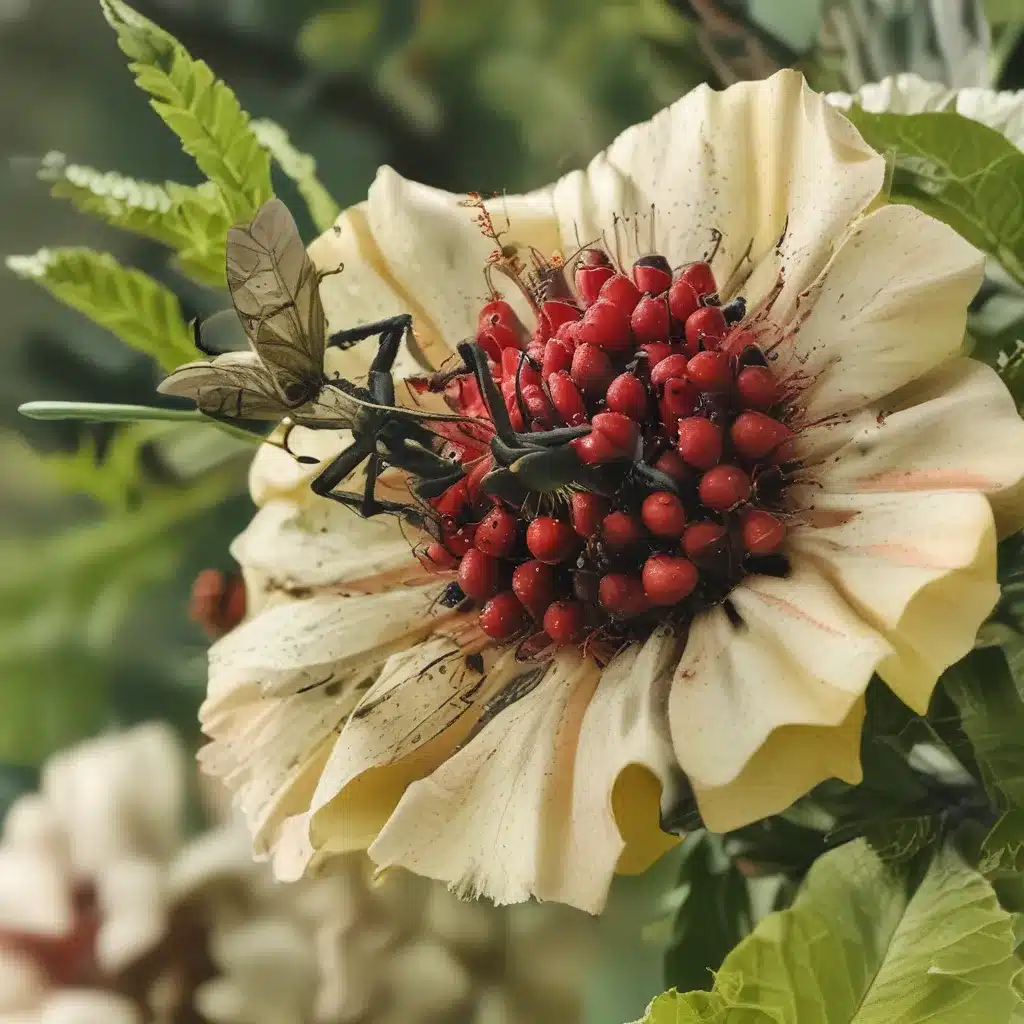
As I stroll through the lush, verdant rows of the Thornapple CSA farm, the air is alive with the buzzing of bees and the chirping of birds. It’s a serene symphony of nature, a harmonious dance between the crops and their caretakers. But behind this idyllic scene lies a carefully crafted strategy – one that harnesses the power of biopesticides to cultivate a thriving, pesticide-free oasis.
Embracing the Organic Approach
When I first joined the Thornapple CSA team, I was struck by the unwavering commitment to organic and sustainable practices. “Pesticides?” scoffed Mark, the farm’s director. “We don’t touch the stuff. Our mission is to nourish the land, not poison it.” His words resonated with me, sparking a deeper appreciation for the holistic approach to farming.
As I delved into the intricacies of Thornapple’s pest management tactics, I discovered a world of natural wonders, each meticulously orchestrated to create a harmonious ecosystem. Biopesticides, derived from natural sources like plants, bacteria, and fungi, have become the cornerstone of their strategy. These eco-friendly alternatives not only safeguard the crops but also nurture the delicate balance of the farm.
Harnessing the Power of Biopesticides
One of the standout biopesticides employed by Thornapple is the Bt (Bacillus thuringiensis) toxin. This naturally occurring bacteria, when applied to the crops, produces a crystal protein that is deadly to specific pests, such as the dreaded corn earworm. By targeting these destructive insects, the Bt toxin protects the crops without harming beneficial organisms or polluting the soil.
“It’s like nature’s own private security team,” quips Mark, a mischievous twinkle in his eye. “The pests never know what hit them!”
But the Thornapple team doesn’t stop there. They also utilize essential oils derived from plants, such as rosemary, thyme, and peppermint, to create a natural repellent barrier. These aromatic compounds not only deter unwanted pests but also contribute to the farm’s distinct and inviting scent, drawing in pollinators and beneficial insects.
Nurturing a Balanced Ecosystem
One of the key principles underlying Thornapple’s biopesticide strategy is the importance of maintaining a balanced ecosystem. “It’s not just about killing the bad guys,” explains Mark. “It’s about creating an environment where the good guys can thrive and do their job.”
To achieve this, the farm team has meticulously planted a diverse array of flowering plants and herbs, providing a haven for predatory insects like ladybugs, lacewings, and parasitic wasps. These natural allies prey on the pests, creating a self-regulating system that minimizes the need for external intervention.
“It’s like a well-choreographed dance,” Mark says, his hands animatedly illustrating the intricate web of interactions. “Each player has a role to play, and when they all work together, the entire farm benefits.”
Adapting to Challenging Conditions
Of course, managing pests organically is not without its challenges. Extreme weather patterns, such as drought or excessive rainfall, can disrupt the delicate balance of the ecosystem, leaving crops vulnerable to infestations.
But the Thornapple team is nothing if not resilient. They’ve developed a suite of adaptable strategies to address these fluctuating conditions. For instance, they’ve experimented with companion planting, strategically placing certain crops and herbs next to each other to enhance pest deterrence and soil fertility.
“It’s like a well-planned dance card,” Mark chuckles. “We pair up the right partners to create a harmonious performance.”
Additionally, the farm has invested in innovative monitoring and early warning systems, allowing them to quickly detect emerging pest threats and respond with targeted biopesticide applications.
The Power of Community Collaboration
One of the most remarkable aspects of Thornapple’s organic pest management strategy is the way it fosters a sense of community and collaboration. The farm regularly hosts educational workshops and field days, sharing their knowledge and best practices with fellow farmers, gardeners, and CSA members.
“We’re all in this together,” Mark emphasizes. “By working collaboratively, we can amplify our impact and create a healthier, more sustainable future for our land and our communities.”
This spirit of cooperation extends beyond the farm’s borders, as Thornapple actively collaborates with research institutions, environmental organizations, and even local schools. By pooling resources and expertise, they’ve been able to develop innovative solutions and spur further advancements in organic farming techniques.
Cultivating a Healthier Future
As I stroll back through the verdant rows of the Thornapple CSA farm, I can’t help but feel a sense of awe and inspiration. This place is not just a source of fresh, nutritious produce – it’s a living testament to the power of sustainable, nature-based solutions.
Through their unwavering commitment to organic practices and their innovative use of biopesticides, the Thornapple team has created a thriving, pesticide-free oasis that nourishes both the land and the community. And as I reflect on the lessons I’ve learned, I’m reminded of the lasting impact that a single farm can have on the world around it.
So, if you’re ever in the mood for a culinary adventure and a glimpse into the future of sustainable agriculture, be sure to visit Thornapple CSA. You just might discover the power of biopesticides and the transformative potential of organic farming.



